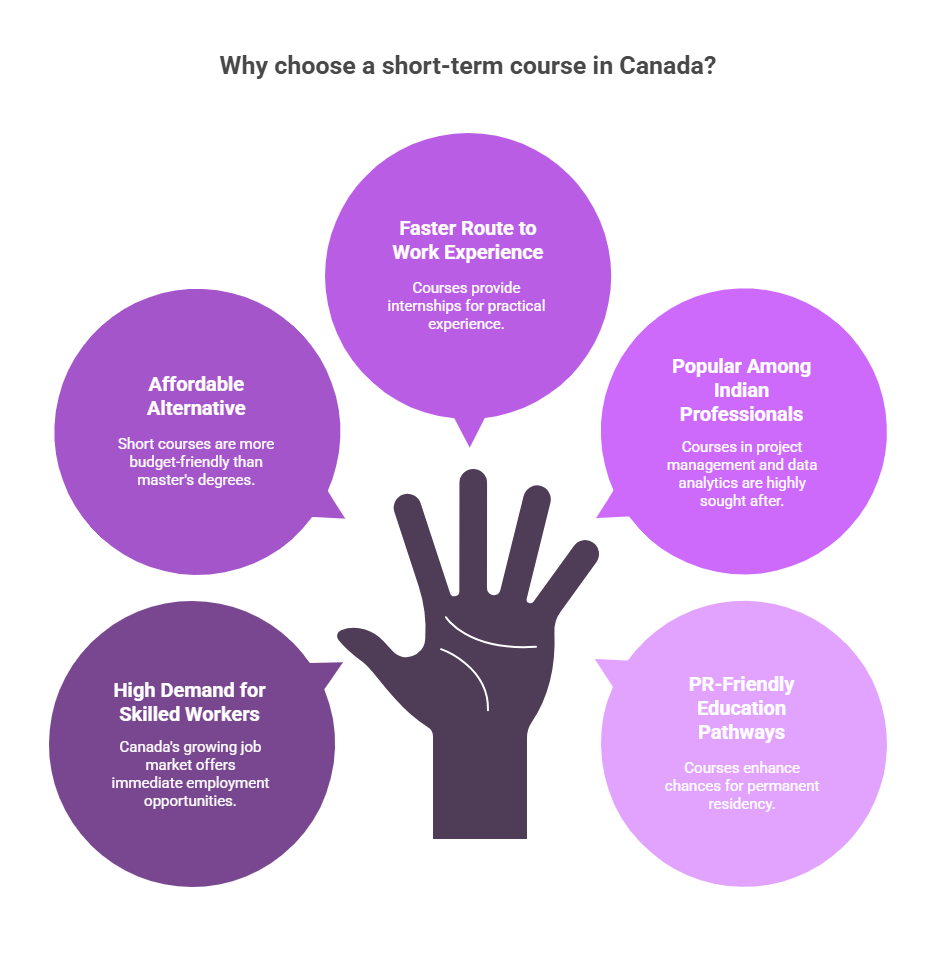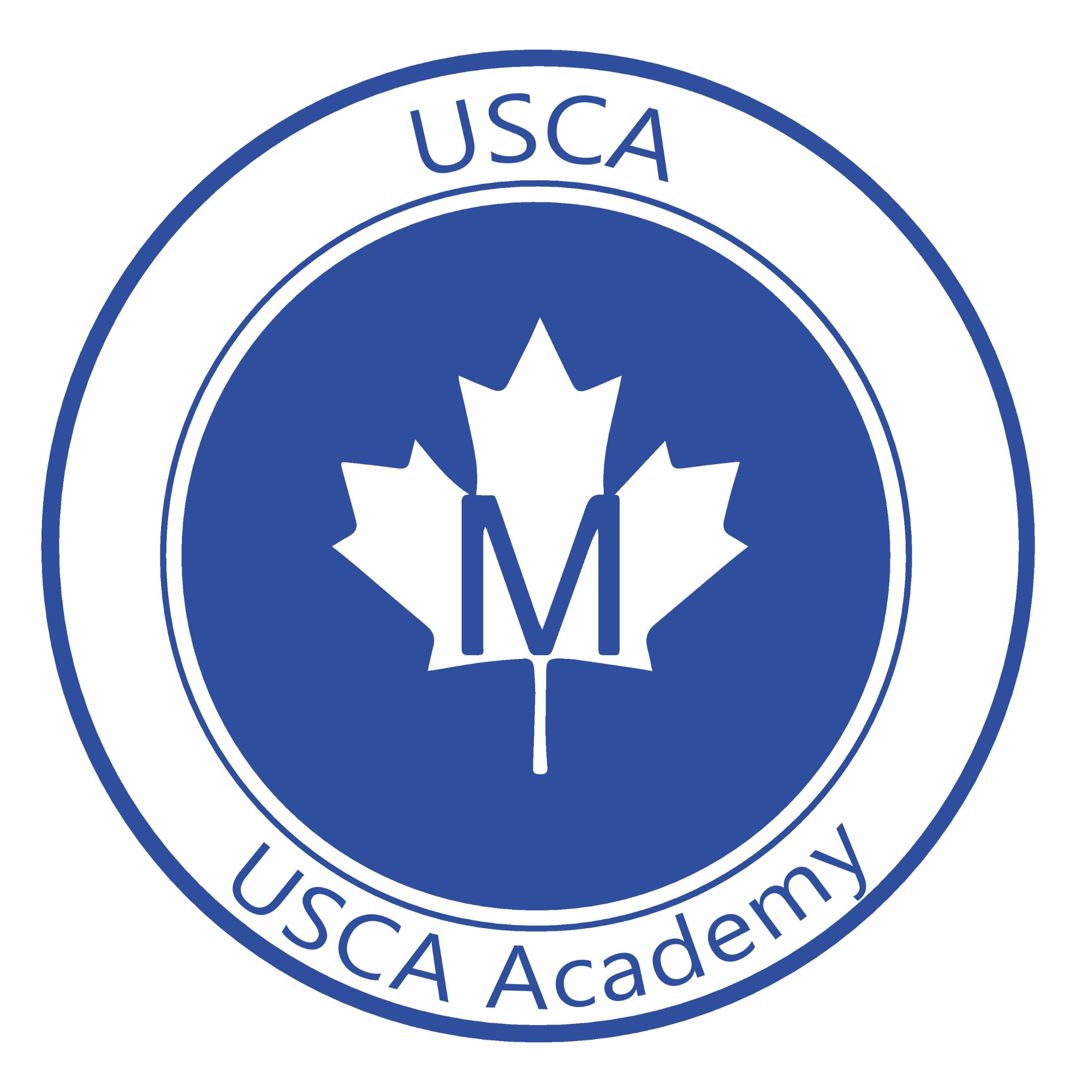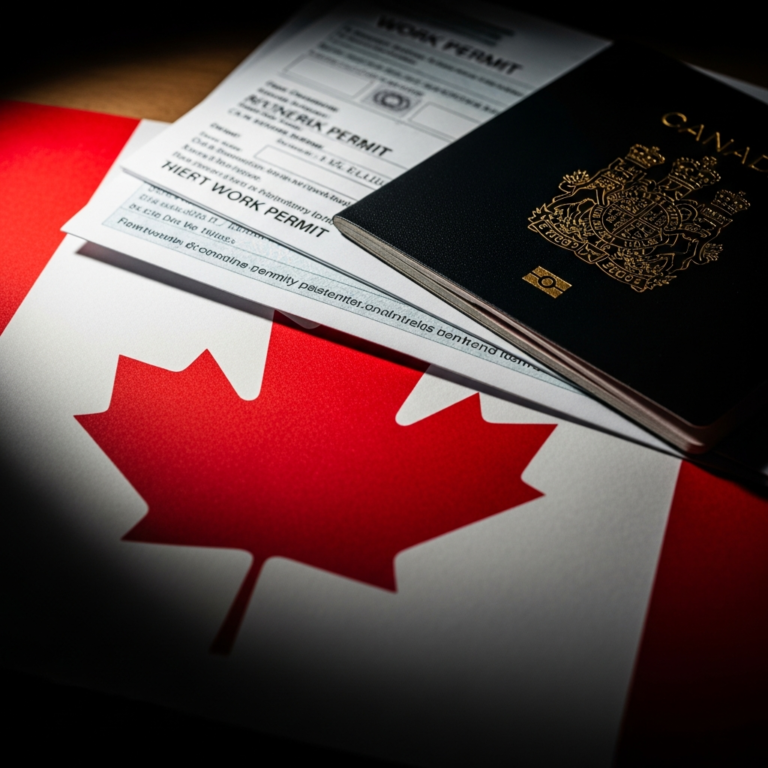Want to study abroad without committing to a 4-year degree? Canada’s short courses for international students offer the perfect solution. These flexible programs let you upskill quickly while exploring new fields, advancing your career, and gaining practical skills. Explore Canada short courses for international students that offer skill-based learning, flexible durations, and career advancement opportunities.
These career-focused programs deliver in-demand skills in as little as 6 months, with many offering co-op placements. Additionally, they are frequently more accessible and reasonably priced, which attracts students from all around the world. Study in Canada for International Students offers world-class education, post-study work opportunities, and a pathway to permanent residency in a multicultural environment.
An Overview of Short Courses in Canada for International Students
One of the most popular places for international students to enrol in short-term courses is Canada. As we all know, this nation provides excellent education, a friendly atmosphere, and several chances to quickly acquire useful skills. Whether you aim to:
- Boost your resume
- Switch careers
- Gain Canadian work experience
These intensive programs lead to immediate employment opportunities.:
- Immediate employment
- Higher salaries
- Permanent residency pathways
A university prep course helps international students build the academic skills, language proficiency, and confidence needed to succeed in Canadian universities. Short courses in Canada for international students are renowned for their flexibility.

Why Choose a Short-Term Course in Canada?
- High Demand for Skilled Workers
According to Statistics Canada’s Labour Market Report, over 1.2 million skilled job vacancies will appear by 2026 thus becoming an ideal migration destination for skilled students and professionals.
- Affordable Alternative to Master’s Degrees
International students find Canadian short-term programs affordable since Tuition at public colleges typically ranges from CAD 8,000 – 20,000 (source: Colleges Ontario 2023 fee guide) (₹5 – 12 lakhs) while standard master’s degrees surpass CAD 30,000 (₹18+ lakhs).
- Faster Route to Work Experience
The courses exist for periods ranging from six months to one year while providing internship or cooperative learning components that enable students to obtain Canadian work experience together with industry background knowledge.
- Popular Among Indian Professionals
Above all, courses focused on project management alongside data analytics and digital marketing demonstrate special appeal to Indian professionals who use them both for obtaining better career options and immigration status.
- PR-Friendly Education Pathways
The delivery of short-term programs that teach in-demand skill sets through IT, healthcare and business sectors increases work possibilities and strengthens candidates for Canadian permanent resident status.
Popular Fields of Study for Short Courses in Canada
Among the nicest aspects about studying in Canada is the large selection of short courses. The most popular fields for short-term study include the arts, technology, business, and healthcare. The goal of these programs is to impart practical and hands-on skills. Explore small private high schools near me that offer focused academic support and a close-knit learning environment.
If you are interested in healthcare, you can choose from various short nursing courses in Canada for international students. These courses give students a head start on their future medical studies, help them acquire critical nursing skills, or prepare them for careers in healthcare.
There are also short medical courses in Canada for international students that cover areas such as clinical support skills, healthcare management, and medical office administration. These courses are ideal for students who wish to advance their credentials without completing years of education or who wish to enter the healthcare industry rapidly.
Curious about healthcare options? Let’s dive into the popular fields for short courses in detail.
Business and Management Short Courses
This one is the most popular option for international students who wish to learn about global markets, hone their leadership abilities, or pursue entrepreneurship. Many top colleges in Canada short courses for international students offer short-term programs in areas such as business administration, project management, marketing, finance, and human resources.
| Business & Management Courses | Duration | Typical Tuition (CAD) | Top Colleges |
| Project Management | 8 months – 1 year | 12000-18000 | Seneca, Lambton, Fanshawe |
| Business Management | 1 Year | 10,000-16,000 | Conestoga, George Brown |
| International Business | 1 Year | 11,000-17,000 | Humber, Centennial |
| Supply Chain Management | 1 Year | 11,000-16,000 | Georgian, Niagara, Cambria |
Technology and IT Short Courses
These short courses provide international students with an excellent chance to gain proficiency in fields including software development, data analysis, programming, and cybersecurity. They are perfect for those who wish to enter the IT sector but lack the time for lengthy degrees. Tech online short courses in Canada for international students are also available. They enable you to obtain a recognised Canadian qualification while learning at your own speed and from your convenient location.
| Course/Program | Duration | Typical Tuition (CAD) | Top Colleges |
| Data Analytics | 1 year | 13,000 – 20,000 | George Brown, Durham, Seneca |
| Artificial Intelligence | 1 year | 15,000 – 22,000 | St. Clair, Mohawk, Humber |
| Cybersecurity | 1 year | 13,000 – 20,000 | Northern, NBCC, Algonquin |
| Web & Mobile App Development | 8 months – 1 year | 10,000 – 17,000 | Sheridan, Algonquin, Georgian |
| Cloud Computing | 1 year | 14,000 – 18,000 | Centennial, Lambton |
Healthcare and Social Services
When I arrived in Toronto last January, I was amazed by the 300+ short programs available, which may help in starting a career in one of the most reputable healthcare systems in the world and acquire useful skills. These programs range from short nursing courses in Canada for international students to specialised courses in patient care, healthcare management, and medical support.
| Course/Program | Duration | Typical Tuition (CAD) | Top Colleges |
| Healthcare Administration | 1 Year | 12,000 – 18,000 | NorQuest, Confederation |
| Health Information Management | 1 Year | 13,000 – 17,000 | George Brown, Saskatchewan Polytechnic |
| Early Childhood Education (ECE) | 1 Year | 10,000 – 14,000 | Cambrian, VCC, Northern |
Duration and Certification for Short Courses in Canada
The field and the particular course determine how long these programs last. While some courses can take up to six months to complete, others could just last a few weeks. Students often obtain a certificate upon completing these courses. By highlighting your acquired talents and providing you with a competitive advantage in the job market, Canadian certifications are recognised globally – 89% of employers value Canadian certifications (Source: World Education Services Report).
The certification obtained from the 6 month short term courses in Canada for international students can help open doors to work prospects, regardless of your goals – improving your CV, changing jobs, or embarking on a new journey.
Online and On-Campus Short Courses in Canada for International Students
When it comes to education, International students now have more options than ever before. There are many options for online short courses in Canada for international students and on-campus programs that meet a range of demands, regardless of your preference for the freedom of studying from home or the immersion experience of on-campus learning.
Advantages of Online Short Courses
These can provide several significant advantages. Here are a few of them:
Flexibility
You can study on your schedule. You’re in control of when and how you learn, allowing you to tailor the program to fit your life.
Affordability
These often have lower tuition fees compared to on-campus programs. Institutions offer these short courses at more affordable prices, making them an attractive option for budget-conscious students.
Accessibility
As long as you have an internet connection, you can take an online course from anywhere you want. This is particularly convenient for those who are busy with other responsibilities.
After you finish your online short course, you will earn a recognised Canadian certificate. This can improve your CV and raise your chances of landing a job.
Why Choose On-Campus Courses?
The following are the main advantages of selecting on-campus courses:
- They include practical, hands-on activities that let students put what they’ve learned into practice.
- You may interact face-to-face with teachers, other students, and outside speakers when you’re on campus.
- Moreover, many fields like healthcare and business involve face-to-face interaction, so these courses can help you enhance communication and negotiation skills.
How to Apply for Short Courses in Canada
Applying for short courses is a very simple process. Follow these steps:
- Choose Your Program
- Check Admission Requirements
- Submit Your Application
- Pay the Application Fee
- Provide Proof of English Proficiency
- Apply for a Study Permit (If Necessary) – Always check the Canada education visa requirements.
- Wait for Acceptance and Receive Your Offer
Affordable Short Courses in Canada for International Students
Although studying abroad might seem costly, many short courses in Canada are reasonably priced for international students and provide a top-notch education without breaking the bank. Canada is a great place to take short courses if you want to advance your profession and learn new skills at a reasonable price.
How to Find Budget-Friendly Short Programs
Here are some helpful tips to find the best options:
- First, research public institutions because they generally offer lower tuition fees compared to private ones.
- Look for online short courses at reputable universities or colleges because their fees tend to be more affordable than on-campus programs.
- Search for scholarships and financial aid options because these can significantly reduce your tuition fees.
Scholarships and Financial Aid Options for Short Courses in Canada
| Scholarship Name | Eligibility Criteria | Typical Award (CAD) |
|---|---|---|
| Canada-ASEAN Scholarships | Students from ASEAN countries | $3,000 – $10,000 |
| Vanier Canada Graduate Scholarship (for certain postgraduate short programs) | Academic excellence, leadership | $15,000 – $20,000 |
| Ontario Trillium Scholarships | High-achieving international students | $10,000 – $15,000 |
| Institution-Specific Bursaries | Based on financial need or merit | Varies by school |
| Commonwealth Scholarships | Commonwealth country citizens | Up to full tuition |
Cost of Living and Tuition in Canada
Even though Canada is renowned for having a top-notch educational system, the final cost might vary based on several factors. This breakdown will assist you in efficiently managing your spending:
- You can opt for public institutions and online, cheap short courses in Canada for international students.
- You can live in smaller cities like Quebec or Winnipeg that offer lower living expenses, making them more affordable options.
- You can choose off-campus accommodations and use public transport, as they are more affordable.
Visa and Immigration Requirements for Short Courses in Canada
It is very important to understand all the requirements for short courses in Canada. There are a few things you must do to make sure your application is accepted. This list will assist you in navigating the process:
Study Permit Requirement
International students who plan to enrol in any program (long or short-term) in Canada must have a study permit. You must show that you have enough money to pay for your tuition and living expenses, as well as proof of admission from an accredited university, to apply for a study visa.
Short-Term Study Options
Programs under 6 months don’t require a study permit unless they include a co-op. Always confirm with IRCC’s official guidelines . To prevent any misunderstandings, it is crucial to verify this with your organisation and Canadian immigration officials.
Documents Needed for Study Permit Application
You must include several important documents with your study visa application, including:
- A valid passport
- A letter of acceptance from a designated learning institution in Canada
- Proof of sufficient funds to support yourself while studying
- Police clearance certificates (if required)
- A medical exam (if required based on your country of residence)
However, always double-check the document requirements.
Application Process
It involves filling out an online or paper application, paying the application cost, and sending in the required documents. Following the processing of your application, you could be required to produce biometrics (a photo and your fingerprints) or attend an interview.
Canada Education Visa Requirements for International Students
International students must fulfil certain Canada education visa requirements in order to be eligible for a study permit. This entails demonstrating sufficient financial means, being a law-abiding citizen with no criminal history, and demonstrating that you intend to depart Canada after finishing your degree.
Work While Studying
Your study permit allows you to work 20 hours weekly during the academic year and full-time during specified breaks if your program is full-time and at an accredited school. You must, however, confirm that your study visa permits you to work and follow the guidelines set forth by Canadian immigration officials.
Post-Graduation Work Permit (PGWP)
Only programs longer than 8 months qualify for a PGWP. For example, PGWP duration matches program length (minimum 8 months, up to 3 years) (Source: IRCC PGWP Rules). PGWP offers a great chance to obtain work experience in Canada and to apply for permanent residency through several immigration procedures.
Staying Compliant with Canadian Immigration Laws
It’s critical to adhere to Canadian immigration regulations. Keep a note of when your visa expires and make sure you renew your study permit if necessary. To prevent problems with Canadian immigration officials, always abide by the employment hours and other requirements listed on your study visa.
Benefits of Short Courses in Canada for International Students
There are several benefits to enrolling in Canada’s short courses for international students, which may have a big influence on their career and personal growth. The following are the main advantages of taking short courses in Canada:
Career Advancement
Short courses give you industry-relevant knowledge that might help you stand out in a competitive job market. You may specialise in your profession or explore new career options with these short courses in Canada for international students.
Practical Skills & Hands-On Experience
Hands-on training is critical for tech and healthcare careers, where employers prioritize practical skills. You may obtain comprehensive training quickly without committing to a long-term degree by enrolling in six-month or a few short-term courses in Canada for international students.
Networking and career opportunities
You may broaden your network by meeting students and professionals from different sectors and backgrounds. When searching for a job in Canada or abroad, these contacts might be quite helpful.
Affordable education options
Short courses in Canada are often less expensive than standard degree programs. They often have cheaper tuition costs, and because the programs are short-term, you also save money on living expenses. It’s an affordable method to acquire useful skills without having to deal with the financial burden.
Flexibility for Busy Schedules
You may learn from any location with the availability of many online courses. Those who juggle their education with other responsibilities, online short courses in Canada are ideal for them. These are the benefits of education in Canada for international students.
Work Opportunities After Completing Short Courses in Canada
| Field | Job Roles Examples | Average Starting Salary (CAD) |
| Business | Office Administrator, Sales Assistant | $35,000 – $45,000 |
| Healthcare | Medical Office Assistant, Personal Support Worker | $38,000 – $48,000 |
| IT & Technology | Junior Web Developer, IT Support Technician | $45,000 – $55,000 |
| Hospitality | Hotel Front Desk Clerk, Event Coordinator | $32,000 – $42,000 |
| Graphic Design | Junior Graphic Designer, Design Assistant | $40,000 – $50,000 |
(Source: Job Bank Canada)
Networking and Career Opportunities
Studying in Canada allows you to network with professionals, business leaders, and other students, all of whom can support you in creating long-lasting connections and getting a secured job. Your job success may be significantly impacted by the relationships you form while you are a student. The individuals you meet can assist you in finding possibilities that fit your career objectives, regardless of whether you’re enrolled in short medical courses in Canada for international students or any other sector.
Employers in Canada are more willing to recruit graduates who have quickly acquired specialised expertise because they appreciate the real-world, hands-on training that short courses offer. This implies that by the time you finish your program, you will have a network of connections that can help you land a job in addition to your knowledge.
Conclusion: Start Your Journey with Short Courses in Canada
Limited 2024 seats available – Schedule your free consultation today. Anyone who wishes to improve their abilities, acquire useful knowledge, and needs interesting professional chances can enrol in Canada short courses for international students. Short courses like Seneca’s 8-month Project Management program cost CAD 12,000 and boast a 92% graduate employment rate (Source: Seneca College). Among the many advantages offered by these programs are the opportunity to network with industry experts, obtain practical experience, and even find a job in Canada after graduation. Canada offers specialised short courses in tech, healthcare, and business, like St. Clair College’s AI program, that align with high-demand jobs. Book a Free Consultation Now to Lock Your 2024 Seat!. Secure your spot for 2026!
Frequently Asked Questions About Canada Short Courses for International Students
1. Can I go to Canada for a short course?
Yes, international students can go to Canada for short courses, typically under six months, without requiring a study permit, though a visitor visa may still be needed.
2. Is there any 6 month course in Canada?
Yes, Canada offers several 6-month certificates and short-term courses in fields like business, IT, healthcare, and hospitality at various colleges and training institutes.
3. What is the shortest diploma?
The shortest diploma in Canada is usually a one-year program, though some intensive or accelerated diplomas can be completed in 8 to 12 months.
4. What is Canada’s most demanding job?
As of recent trends, healthcare professionals (like nurses), IT specialists, and skilled trades workers are among Canada’s most in-demand jobs.









